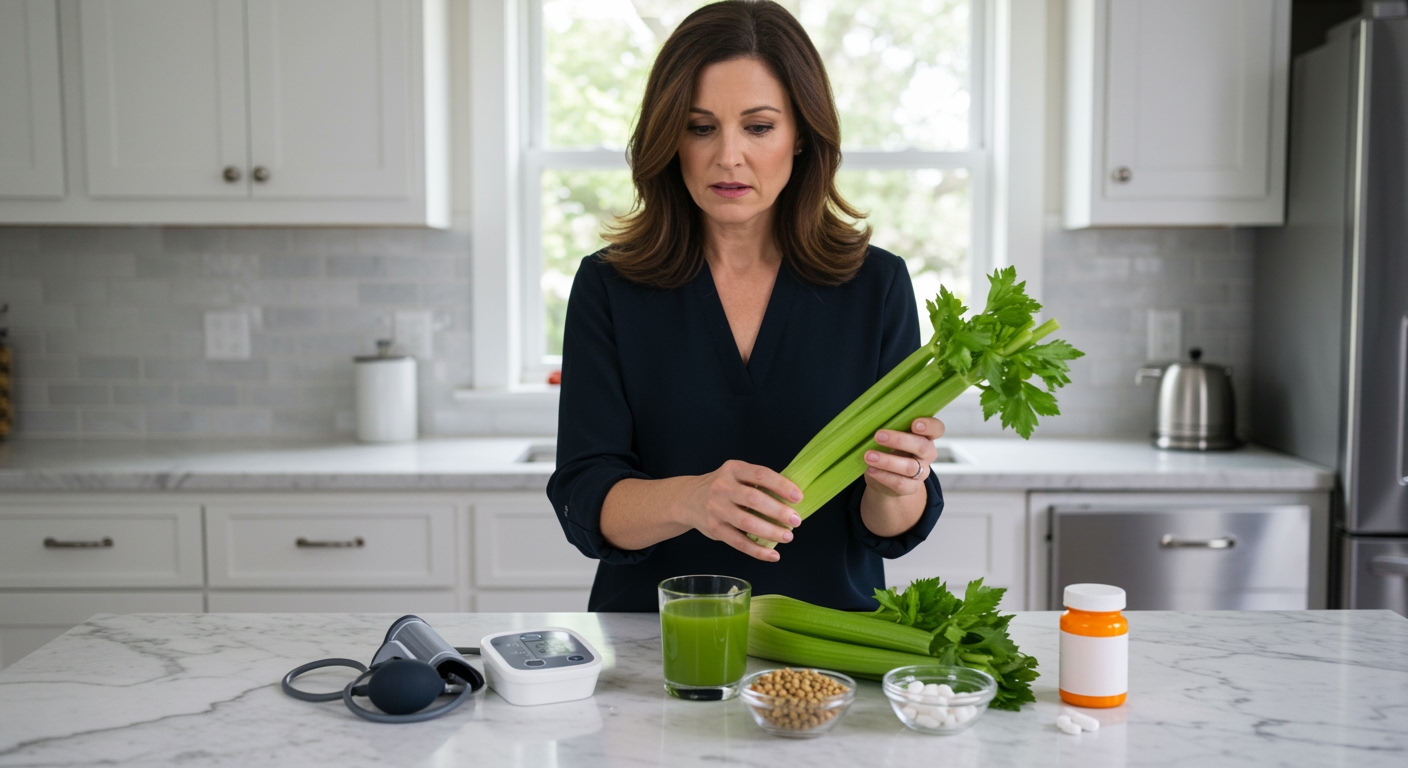✪ Key Takeaway: Celery can lower blood pressure moderately but rarely drops it to dangerous levels in healthy people.
Introduction
Your friend just told you that celery juice dropped her blood pressure so much she felt dizzy and weak.
Now you are wondering if this crunchy green vegetable sitting in your refrigerator could actually be dangerous for your cardiovascular system.
Hi, I am Abdur, your nutrition coach and today I am going to explain exactly how celery affects blood pressure and whether you should be concerned about it dropping your levels too low.
How Does Celery Actually Lower Blood Pressure?
Celery contains phthalides, which are natural compounds that relax the muscles in your blood vessel walls.
When these muscles relax, your blood vessels become wider and blood flows more easily through them.
This process reduces the pressure your heart needs to pump blood throughout your body.
Research shows that celery seed extract can reduce systolic blood pressure by an average of 8-10 mmHg in people with mild hypertension.
The potassium content in celery also helps your kidneys remove excess sodium from your bloodstream.
When sodium levels drop, your body retains less water and blood volume decreases naturally.
These combined effects create a gentle reduction in blood pressure that typically occurs over several hours rather than minutes.
✪ Fact: One cup of chopped celery contains about 263 mg of potassium, which is 6% of your daily needs.
Can Celery Drop Your Blood Pressure Too Low?
The short answer is that celery alone rarely causes dangerously low blood pressure in healthy individuals.
Most people would need to consume massive amounts of celery or concentrated celery extract to experience hypotension.
However, problems can arise when you combine celery with blood pressure medications without medical supervision.
The additive effect of celery compounds plus prescription drugs can push your blood pressure below safe levels.
Symptoms of dangerously low blood pressure include dizziness, fainting, nausea, and rapid shallow breathing.
People taking diuretics, ACE inhibitors, or beta-blockers face the highest risk of this interaction.
Your body typically maintains blood pressure within a safe range through multiple regulatory mechanisms that prevent extreme drops from dietary sources alone.
✪ Note: Blood pressure below 90/60 mmHg is generally considered hypotension and may require medical attention.
Who Should Be Cautious With Celery?
People already taking blood pressure medications should monitor their levels closely when adding celery to their diet.
Those with naturally low blood pressure or a history of hypotension episodes should also exercise caution.
Pregnant women need to be particularly careful because blood pressure naturally drops during the first and second trimesters.
Adding celery extract or large amounts of celery juice could amplify this natural decrease and cause complications.
Elderly individuals often have more sensitive cardiovascular systems and may experience stronger responses to dietary changes.
People with kidney disease should also be cautious because their bodies may not regulate potassium levels effectively.
If you fall into any of these categories, start with small amounts of celery and monitor how your body responds over several days.
✪ Pro Tip: Keep a blood pressure log for two weeks when introducing celery to track any significant changes.
What Amount Of Celery Is Safe?
Most research suggests that 2-3 stalks of celery per day provide blood pressure benefits without safety concerns.
This amount delivers approximately 150-200 mg of phthalides, which is within the therapeutic range studied in clinical trials.
Celery juice concentrates these compounds, so limit yourself to 4-6 ounces daily if you prefer the liquid form.
Celery seed extract supplements are much more potent and should be used only under medical supervision.
These supplements can contain 10-20 times the active compounds found in fresh celery.
Start with smaller amounts and gradually increase over 1-2 weeks to allow your body to adapt naturally.
Pay attention to how you feel after eating celery, especially during the first hour when effects are typically strongest.
✪ Fact: Fresh celery stalks are 95% water, making them a hydrating choice that supports healthy blood pressure naturally.
The Bottom Line
Celery can indeed lower blood pressure, but it rarely drops it to dangerous levels when consumed in normal food amounts.
Smart nutrition means understanding that even healthy foods can interact with medications and existing health conditions.
I would love to hear about your experience with celery and blood pressure in the comments below, and please share any questions you might have about incorporating this vegetable safely into your daily routine.
References
At NutritionCrown, we use quality and credible sources to ensure our content is accurate and trustworthy. Below are the sources referenced in creating this article:
- Natural Health Research: Celery seed extract improves blood pressure in adults with hypertension
- PMC: Effects of celery on cardiovascular health
- PMC: Nutritional compounds in celery and blood pressure regulation
- Medical News Today: Celery nutrition facts and health benefits





